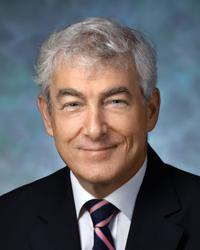Research Lab Results
-
Green Lab
Work in the Green Lab is centered on the ribosome. The overall fidelity of protein synthesis appears to be limited by the action of the ribosome, which is the two-subunit macromolecular machine responsible for decoding and translating messenger RNAs (mRNAs) into protein in all organisms. Our work is divided into four general project areas. The longest-standing research area concerns the interactions of eubacterial ribosomes and release factors. The goal is to understand the mechanism of action of release factors on the ribosome. A second research area involves biochemical and structure/function studies of the miRNA pathway, particularly the mechanism of action of the Argonaute proteins and their interacting factors. A third area of work in the lab is centered around regulation of eukaryotic translation, specifically in understanding the mechanism behind various mRNA quality control pathways and the interactions of proteins therein, as well as with the ribosome. The newest area of research in the lab extends our strengths in ribosome biochemistry to characterize the translation status of the cell using the ribosome profiling. We are using this technique to better understand the role of several factors involved in eukaryotic and prokaryotic translation fidelity. -
Gregg Semenza Lab
The Gregg Semenza Lab studies the molecular mechanisms of oxygen homeostasis. We have cloned and characterized hypoxia-inducible factor 1 (HIF-1), a basic helix-loop-helix transcription factor. Current research investigates the role of HIF-1 in the pathophysiology of cancer, cerebral and myocardial ischemia, and chronic lung disease, which are the most common causes of mortality in the U.S.
-
Goley Lab
The Goley Lab is broadly interested in understanding cellular organization and dynamic reorganization, with particular focus on the roles of the cytoskeleton in these phenomena. We use cell biological, biochemical, genetic and structural approaches to dissect cytoskeletal processes with the aim of understanding how they work in molecular detail. Currently, we are focused on investigating the mechanisms underlying cytokinesis in bacteria. A deep understanding of cytoskeletal function in bacteria will aid in the identification of targets for novel antibiotic therapies and in efforts in synthetic biology. -
GI Biomarkers Laboratory
The GI Biomarkers Laboratory studies gastrointestinal cancer and pre-cancer biogenesis and biomarkers. The lab is led by Dr. Stephen Meltzer, who is known for his research in the molecular pathobiology of gastrointestinal malignancy and premalignancy. Research in the lab has led to several groundbreaking genomic, epigenomic and bioinformatic studies of esophageal and colonic neoplasms, shifting the gastrointestinal research paradaigm toward genome-wide approaches.
-
Jeremy Nathans Laboratory
The Jeremy Nathans Laboratory is focused on neural and vascular development, and the role of Frizzled receptors in mammalian development. We use gene manipulation in the mouse, cell culture models, and biochemical reconstitution to investigate the relevant molecular events underlying these processes, and to genetically mark and manipulate cells and tissues. Current experiments are aimed at defining additional Frizzled-regulated processes and elucidating the molecular mechanisms and cell biologic results of Frizzled signaling within these various contexts. Complementing these areas of biologic interest, we have ongoing technology development projects related to genetically manipulating and visualizing defined cell populations in the mouse, and quantitative analysis of mouse visual system function. -
Joseph Mankowski Lab
The Joseph Mankowski Lab studies the immunopathogenesis of HIV infection using the SIV/macaque model. Our researchers use a multidisciplinary approach to dissect the mechanism underlying HIV-induced nervous system and cardiac diseases. Additionally, we study the role that host genetics play in HIV-associated cognitive disorders.
Principal Investigator
Department
-
J. Hunter Young Lab
Research in the J. Hunter Young Lab focuses on the genetic epidemiology and physiology of cardiovascular disease and its risk factors, especially hypertension, diabetes and obesity. Current activities include an observational study of hypertension among African Americans; a genetic epidemiology study of worldwide cardiovascular disease susceptibility patterns; and several population-based observational studies of cardiovascular and renal disease. A recent focus group study found that changes in housing and city policies might lead to improved environmental health conditions for public housing residents.
-
James Hamilton Lab
The main research interests of the James Hamilton Lab are the molecular pathogenesis of hepatocellular carcinoma and the development of molecular markers to help diagnose and manage cancer of the liver. In addition, we are investigating biomarkers for early diagnosis, prognosis and response to various treatment modalities. Results of this study will provide a molecular classification of HCC and allow us to identify targets for chemoprevention and treatment. Specifically, we extract genomic DNA and total RNA from liver tissues and use this genetic material for methylation-specific PCR (MSP), cDNA microarray, microRNA microarray and genomic DNA methylation array experiments.
-
Joanna Peloquin Lab
The Joanna Peloquin Lab focuses on inflammatory bowel disease (IBD). We're working on individualized care for IBD patients through functional genomic studies, specifically those related to diet, host and microbiota interactions.
-
Chloe Thio Lab
Research in the Chloe Thio lab focuses on several areas. First, HBV virology and immunology in HBV monoinfected and HIV-HBV co-infected individuals that will ultimately help develop a cure for HBV. Second, HCV infection in men who have sex with men. Third, non-alcoholic fatty liver disease with a focus on HIV-infected individuals. Fourth, host genetic determinants of spontaneous HBV recovery and HCV clearance.



